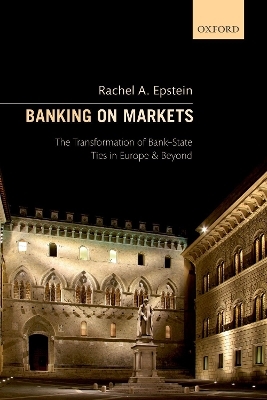
Banking on Markets
Oxford University Press (Verlag)
978-0-19-884969-8 (ISBN)
States and banks have traditionally maintained close ties. At various points in time, states have used banks to manage their economies and soak up government debt, while banks enjoyed regulatory forbearance, restricted competition, and implicit or explicit guarantees from their home markets. The political foundations of banks have thus been powerful and enduring, with actors on both sides of the aisle reluctant to sever relations.
The central argument of this book, however, is that in the world's largest integrated market, Europe, the traditional political ties between states and banks have been transformed. Specifically, through a combination of post-communist transition, monetary union, and economic crisis, states in Europe no longer wield preponderant influence over their banks. Banking on Markets explains why we have witnessed the radical denationalization of this politically vital sector, as well as the consequences for economic volatility and policy autonomy. The findings in Europe have implications for other world regions, which, to varying degrees, have also experienced intensified pressure on their traditional models of domestic political control over finance.
Through an investigation of foreign bank behavior in economic crises, the developmental consequences of political control over banks and the emergence of European Banking Union in the Eurozone, the book advances three main findings. First is that foreign bank ownership need not necessarily lead to economic vulnerability of host states. Second is that marketized bank-state ties do, however, limit pathways to catching up in the global economy. And third is that European Banking Union has strengthened the euro's credibility while cutting down substantially on Eurozone member states' economic policy discretion. This book details the intense political struggles that have underpinned all three outcomes.
Co-Winner of the 2018 Ed A Hewett Book Prize awarded by the Association for Slavic, East European, and Eurasian Studies.
Rachel A. Epstein is Professor of International Relations and European Politics at the Josef Korbel School of International Studies, University of Denver. Her publications include In Pursuit of Liberalism: International Institutions in Postcommunist Europe (Johns Hopkins 2008), and also edited a special issue of the Review of International Political Economy entitled 'Assets or Liabilities? Banks and the Politics of Foreign Ownership versus National Control' (2014). Her research and teaching examine the relationship between economic trends and national security outcomes, the dynamics of postcommunist transition, the role of international organizations in global politics, and economic crises and financial reform.
1: Introduction: The Paradox of Financial Control
2: High and Low Levels of Foreign Bank Ownership: Sources and Consequences
3: Foreign Banks in the Crisis: Retrenchment from the West, Continuing Exposures in the East
4: Catching Up in the Global Economy: Good and Bad Banks in East Central Europe
5: European Banking Union: The Weakening of Bank-State Ties
6: Conclusion: Ceding Autonomy but Limiting Costs: Revisiting the Logic of National Bank Control
| Erscheinungsdatum | 14.11.2019 |
|---|---|
| Verlagsort | Oxford |
| Sprache | englisch |
| Maße | 154 x 232 mm |
| Gewicht | 354 g |
| Themenwelt | Wirtschaft ► Betriebswirtschaft / Management ► Finanzierung |
| Betriebswirtschaft / Management ► Spezielle Betriebswirtschaftslehre ► Bankbetriebslehre | |
| Wirtschaft ► Volkswirtschaftslehre ► Finanzwissenschaft | |
| Wirtschaft ► Volkswirtschaftslehre ► Wirtschaftspolitik | |
| ISBN-10 | 0-19-884969-9 / 0198849699 |
| ISBN-13 | 978-0-19-884969-8 / 9780198849698 |
| Zustand | Neuware |
| Informationen gemäß Produktsicherheitsverordnung (GPSR) | |
| Haben Sie eine Frage zum Produkt? |
aus dem Bereich


